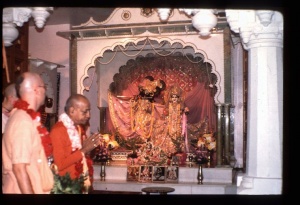CC Madhya 13.146 (1975): Difference between revisions
(Vanibot #0027: CCMirror - Mirror CC's 1996 edition to form a basis for 1975) |
(Vanibot #0020: VersionCompareLinker - added a link to the Version Compare feature) |
||
| Line 2: | Line 2: | ||
<div style="float:left">'''[[Sri Caitanya-caritamrta (1975)|Śrī Caitanya-caritāmṛta (1975)]] - [[CC Madhya (1975)|Madhya-līlā]] - [[CC Madhya 13 (1975)|Chapter 13: The Ecstatic Dancing of the Lord at Ratha-yātrā]]'''</div> | <div style="float:left">'''[[Sri Caitanya-caritamrta (1975)|Śrī Caitanya-caritāmṛta (1975)]] - [[CC Madhya (1975)|Madhya-līlā]] - [[CC Madhya 13 (1975)|Chapter 13: The Ecstatic Dancing of the Lord at Ratha-yātrā]]'''</div> | ||
<div style="float:right">[[File:Go-previous.png|link=CC Madhya 13.145 (1975)|Madhya-līlā 13.145]] '''[[CC Madhya 13.145 (1975)|Madhya-līlā 13.145]] - [[CC Madhya 13.147 (1975)|Madhya-līlā 13.147]]''' [[File:Go-next.png|link=CC Madhya 13.147 (1975)|Madhya-līlā 13.147]]</div> | <div style="float:right">[[File:Go-previous.png|link=CC Madhya 13.145 (1975)|Madhya-līlā 13.145]] '''[[CC Madhya 13.145 (1975)|Madhya-līlā 13.145]] - [[CC Madhya 13.147 (1975)|Madhya-līlā 13.147]]''' [[File:Go-next.png|link=CC Madhya 13.147 (1975)|Madhya-līlā 13.147]]</div> | ||
{{CompareVersions|CC|Madhya 13.146|CC 1975|CC 1996}} | |||
{{RandomImage}} | {{RandomImage}} | ||
==== TEXT 146 ==== | ==== TEXT 146 ==== | ||
<div class="verse"> | <div class="verse"> | ||
:tomāra ye anya veśa, | :tomāra ye anya veśa, anya saṅga, anya deśa, | ||
:vraja-jane kabhu nāhi bhāya | :vraja-jane kabhu nāhi bhāya | ||
:vraja-bhūmi chāḍite nāre, | :vraja-bhūmi chāḍite nāre, tomā nā dekhile mare, | ||
:vraja-janera ki habe upāya | :vraja-janera ki habe upāya | ||
</div> | </div> | ||
| Line 27: | Line 26: | ||
<div class="translation"> | <div class="translation"> | ||
" 'The inhabitants of Vṛndāvana do not want You dressed like a prince, nor do they want You to associate with great warriors in a different country. They cannot leave the land of Vṛndāvana, and without Your presence, they are all dying. What is their condition to be? | |||
</div> | </div> | ||
Latest revision as of 07:35, 27 January 2020

A.C. Bhaktivedanta Swami Prabhupada
TEXT 146
- tomāra ye anya veśa, anya saṅga, anya deśa,
- vraja-jane kabhu nāhi bhāya
- vraja-bhūmi chāḍite nāre, tomā nā dekhile mare,
- vraja-janera ki habe upāya
SYNONYMS
tomāra—Your; ye—that; anya veśa—different dress; anya saṅga—other associates; anya deśa—other countries; vraja-jane—to the inhabitants of Vṛndāvana; kabhu—at any time; nāhi—does not; bhāya—appeal; vraja-bhūmi—the land of Vṛndāvana; chāḍite nāre—they do not like to leave; tomā—You; nā—not; dekhile—seeing; mare—they die; vraja-janera—of the inhabitants of Vṛndāvana; ki—what; habe—will be; upāya—means.
TRANSLATION
" 'The inhabitants of Vṛndāvana do not want You dressed like a prince, nor do they want You to associate with great warriors in a different country. They cannot leave the land of Vṛndāvana, and without Your presence, they are all dying. What is their condition to be?